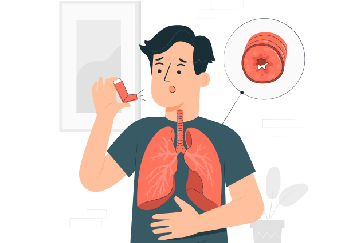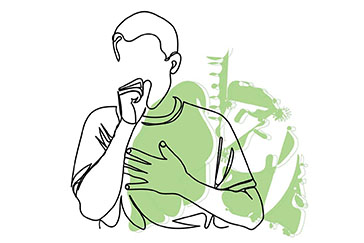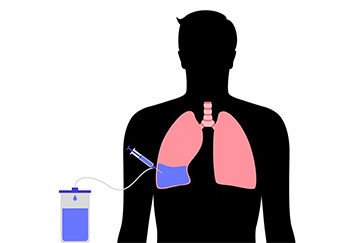 Book Appt.
Book Appt.
 Call Now
Call Now


Asthma (sometimes known as bronchial asthma) is a lung condition. It's a chronic (ongoing) ailment, which means it won't go away and requires ongoing medical treatment. When you breathe regularly, the muscles around your airways relax, allowing air to pass freely and softly. During an asthma episode, three things could occur:
When your airways become tighter, you emit a sound known as wheezing when you breathe, which is the same noise your airways make when you exhale. An asthma episode may also be referred to as an exacerbation or flare-up. It refers to when your asthma is uncontrolled.
Types of asthma
Asthma is classified into kinds based on the origin and severity of symptoms. Healthcare practitioners define asthma as:
Asthma has several causes:
Asthma may also be:
In addition, there are these types of asthma:
Symptoms
Asthmatic patients typically have evident symptoms. These signs and symptoms are similar to many other respiratory infections:
With asthma, you may not have all of these symptoms with every flare. You can have different symptoms and signs at different times with chronic asthma. Also, symptoms can change between asthma attacks.
Causes
The reason why some people develop asthma and others do not is unknown to researchers. However, several factors carry a larger risk:
What frequently causes an asthma attack?
If you come into contact with irritating substances, you may experience an asthma attack. These drugs are referred to by healthcare providers as "triggers." Knowing what causes your asthma episodes helps you avoid them. For some people, a trigger can cause an attack right soon. For other people or at other times, an attack may occur hours or days later. Triggers might vary depending on the individual. However, typical triggers include air pollution, dust mites, exercise, mildew, pests, pets, tobacco smoke, harsh chemicals or odors, and some occupational exposures.
Diagnosis
Your healthcare professional will go over your medical history, including information about your parents and siblings. Your provider will also inquire about your symptoms. Your doctor will need to know if you have ever had allergies, eczema (a rough rash caused by allergies), or other lung disorders. Your doctor may order spirometry. This test monitors airflow through your lungs and is used to diagnose and track your progress during treatment. Your doctor may request a chest X-ray, a blood test, or a skin test.
Treatment
You have alternatives for managing your asthma. Your doctor may recommend drugs to help you manage your symptoms. This includes:
You can take asthma medication in a variety of ways. You can inhale the medications with a metered-dose inhaler, nebulizer, or another type of asthma inhaler. Your healthcare practitioner may prescribe oral drugs for you to take.
Prevention
If your healthcare professional diagnoses you with asthma, you must determine what causes an episode. Avoiding the triggers may help you avoid an attack. However, you cannot prevent yourself from developing asthma.
Conclusion
With proper therapy and lifestyle changes, asthma can be managed. Understanding the triggers, symptoms, and available treatments allows people to take charge of their health and avoid consequences. People with asthma can live active and satisfying lives by working closely with their healthcare providers and following an asthma action plan. For information, visit SHALBY Sanar International Hospitals in Gurugram.
SHALBY Sanar International Hospitals provides extensive medical procedures backed up with our state-of-the-art technology and a team of highly qualified & experienced clinical experts.
Our doctors pen down their research findings and experiences from time to time. Their words provide deep insight into the latest techniques, technologies and other advancements in healthcare. It provides expert answers to all kinds of health questions for real-life issues.
VIEW ALL




Since the day of its foundation, SHALBY Sanar International Hospitals is committed to provide comprehensive healthcare services. It regularly organizes awareness programs in its premises and encourages outdoor healthcare activities and camps with an intent to put focus on preventive healthcare.
VIEW ALL